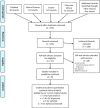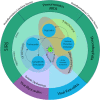Ventricular repolarization heterogeneity in patients with COVID-19: Original data, systematic review, and meta-analysis
- PMID: 35005792
- PMCID: PMC8799060
- DOI: 10.1002/clc.23767
Ventricular repolarization heterogeneity in patients with COVID-19: Original data, systematic review, and meta-analysis
Abstract
Background: Coronavirus disease-2019 (COVID-19) has been associated with an increased risk of acute cardiac events. However, the effect of COVID-19 on repolarization heterogeneity is not yet established. In this study, we evaluated electrocardiogram (ECG) markers of repolarization heterogeneity in patients hospitalized with COVID-19. In addition, we performed a systematic review and meta-analysis of the published studies.
Methods: QT dispersion (QTd), the interval between T wave peak to T wave end (TpTe), TpTe/QT (with and without correction), QRS width, and the index of cardio-electrophysiological balance (iCEB) were calculated in 101 hospitalized COVID-19 patients and it was compared with 101 non-COVID-19 matched controls. A systematic review was performed in four databases and meta-analysis was conducted using Stata software.
Results: Tp-Te, TpTe/QT, QRS width, and iCEB were significantly increased in COVID-19 patients compared with controls (TpTe = 82.89 vs. 75.33 ms (ms), p-value = .005; TpTe/QT = 0.217 vs. 0.203 ms, p-value = .026). After a meta-analysis of 679 COVID-19 cases and 526 controls from 9 studies, TpTe interval, TpTe/QT, and TpTe/QTc ratios were significantly increased in COVID-19 patients. Meta-regression analysis moderated by age, gender, diabetes mellitus, hypertension, and smoking reduced the heterogeneity. QTd showed no significant correlation with COVID-19.
Conclusion: COVID-19 adversely influences the ECG markers of transmural heterogeneity of repolarization. Studies evaluating the predictive value of these ECG markers are warranted to determine their clinical utility.
Keywords: COVID-19; QT dispersion; T-peak to T-end; electrocardiography; repolarization disparity; repolarization heterogeneity; sudden cardiac death.
© 2022 The Authors. Clinical Cardiology published by Wiley Periodicals LLC.
Conflict of interest statement
The authors declare that there are no conflict of interests.
Figures



References
-
- Aedma SK, Mahajan P, Gadela NV, Okafor T, Patel M, Jadav R. Prevalence and outcomes of cardiovascular complications amongst COVID‐19 patients. J Am Coll Cardiol. 2021;77(18_Suppl_1):3063.
-
- Laleh Far V, Mehrakizadeh A, Eslami M, et al. Electrocardiography Holter monitoring in critically ill patients with coronavirus disease 2019 (COVID‐19). Pol Arch Med Wewn. 2020;130(11):1010‐1012. - PubMed
Publication types
MeSH terms
LinkOut - more resources
Full Text Sources
Medical

